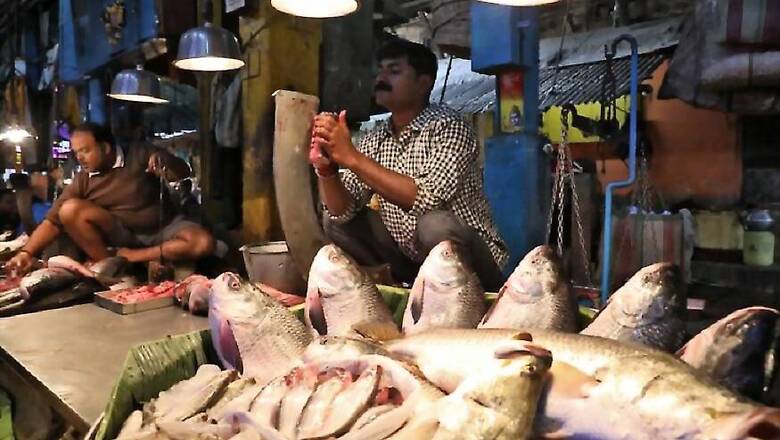
views
An avid fish lover, Sumoy Chatterjee (57), never missed a day without visiting Muchibazar market, near Bidhannagar Railway Station in Kolkata, to get his best bargained Ilish (Hilsa), Topse (Mango Fish) and Desi Parshey (Mullet).
But this Thursday is a special day with Bengalis celebrating ‘Jamai Shashti’, which marks the cordial relationship of a man with his in-laws.
However, despite markets being open (while maintaining social distancing norms), the favourite fishes of Bengali households to pamper the son-in-law with like Ilish, Bhetki (Asian Sea Bass), Pabda (Ompok Pabda), Desi Parshey, Bagda Chingri (Tiger Prawn), Gaulda Chingri (Jumbo Prawn), Koi (Amur Carp), Mourola (Indian Carplet), Rui (Rohu) and Katla (Catla) were missing from the platter because of non-availability of stock.
Even if stocks were available in some places, the prices were beyond the reach of common man.
Chatterjee and several others like him who could not go to their local markets for weeks due to the Covid-19 pandemic and lockdown were happy when West Bengal chief minister Mamata Banerjee decided to ease the restrictions from May 15. But the skyrocketing prices upset buyers like them.
“This year Jamai Shashti was eclipsed by Covid-19 pandemic and Cyclone Amphan. I went to Muchibazar today to buy Ilish, Topse and Desi Parshey, but unfortunately I got only 'desi' Parshey and that too the one which came from Paradwip in Odisha. We have invited our son-in-law for Jamai Shashti but, unfortunately, we will not be able to treat him with his favourite Ilish. We have decided to strike a few fish dishes off the menu and will compensate with mutton or chicken,” said Chatterjee.
In most of the big retail and wholesale markets like Muchibazar, Manicktala, Howrah, Sealdah’s Koley Market, Ultadanga, Patipukur, Baguihati, etc, the situation is grim as there are few buyers due to the high prices of limited stock of fishes.
Adhir Biswas, general secretary of Sealdah Wholesale Matasya Byabsayee Samity (Sealdah Wholesale Fish Traders Association), said, “There is a huge crisis of fish in the market due to Covid-19 lockdown and Cyclone Amphan. Since the supply of fish is less, the prices are marginally higher. I hope in the coming days, things will become normal.”
In retail fish markets, since there is no small Bhetki, the big ones weighing around 2-2.5 kg are priced close to Rs 750-800 per kg. Pabda (large) prices are hovering around Rs 600-650/kg. Parshey (per piece weighing around 80-100 grams) is close to Rs 550-600/kg.
Other delicacies like Ilish and Chingri are selling at exorbitant rates.
While the prices of Ilish are hovering around Rs 900 to Rs 1,800/kg (depending on size), the prawns range between Rs 600 to Rs 750 per kg. Shrimps are selling at Rs 400-450/kg.
“The prices of fish have increased by 15 to 30 per cent in all the retail and wholesale markets due to lockdown and coronavirus pandemic. From mid-April till today, the fishermen were not allowed to go into deep sea. Over the weeks, there was an acute shortage of fish stocks and the fishes we are receiving from Andhra Pradesh and Odisha are not enough to meet the demand. This is the reason behind the skyrocketing price of fishes in the market,” said Bapi Das, a fish wholesaler at Sealdah Market.
“Due to Covid-19 lockdown and Cyclone Amphan, local produce including vegetables and fishes were badly affected. Only fishes from other states are available and this has led to the soaring prices in the market,” he added.
Syed Anawar Maqsood, secretary of West Bengal Fish Importers Association, said, “The demand for Hilsa is less this time because of economic uncertainty among the buyers owing to Covid-19 lockdown."
Business is badly affected and Cyclone Amphan has impacted it further, traders said.
“Since fishing was banned here due to the lockdown, nearly 1,000 tonnes of Hilsa has been imported from Myanmar. It is lying at the wholesale markets. It is not that there is no demand for Hilsa but buyers are reluctant due to its high price and economic uncertainty. We are all are concerned about what will be the shape of the business and earnings in future. We are hopeful that things will normalise in coming weeks,” Maqsood said.
The situation is similar for the prices of vegetables that have witnessed a 20-25 per cent rise. Vegetables like potol or parwal (pointed gourd) are being sold at Rs 30-40/kg, okra (bhindi) is around Rs 50-55 per kg, jhinge (ridge gourd) is selling at Rs 45-55/kg, onion is around Rs 25-30/kg, chandramukhi potato is close to Rs 30 per kg.




















Comments
0 comment